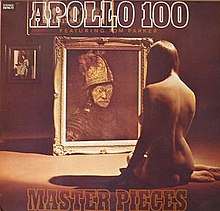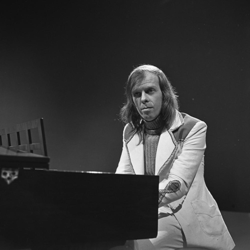Apollo 100
Apollo 100 was a short-lived British instrumental studio-based group that had a top 10 hit with the Johann Sebastian Bach–inspired single "Joy" in 1972.[1]
The recording of "Joy" as performed by Apollo 100 is a nearly note-for-note remake of the arrangement of "Jesu, Joy of Man's Desiring" (but with modern pop music flourishes like percussion, electric guitar and bass) as recorded by the British band Jigsaw on their 1970 debut album Letherslade Farm.
Tom Parker was an accomplished arranger responsible for most of the successful arrangements from the Young Blood catalogue, such as the Top 20 American hit "Chirpy Chirpy Cheep Cheep" and a number of Don Fardon's recordings. Parker is a multi-instrumentalist, having played keyboards, clarinet, saxophone, trumpet, trombone, and a number of other instruments from an early age. His first performances were in and around Newcastle upon Tyne, where he performed in a number of jazz clubs. Following this he was associated with a number of groups, including The Mark Leeman 5, Jimmy James and the Vagabonds, and Eric Burdon with the New Animals. He put together the band in 1972, with drummer Clem Cattini, guitarist Vic Flick, guitarist Zed Jenkins, percussionist Jim Lawless, and bassist Brian Odgers. Their first single, "Joy", based on Bach's "Jesu, Joy of Man's Desiring", rose to number 6 on the Billboard Hot 100 in the US. None of their subsequent efforts were as successful, and they broke up in 1973.
The US release of "Joy" was handled by the Nashville, Tennessee based independent label Mega Records, who released it there as a 7" single in November 1971.[2]
"Joy" has subsequently been featured in the soundtracks of the films Boogie Nights, One Day in September, The 40-Year-Old Virgin, and Battle of the Sexes.
Discography
Joy, LP, March 1972,[3] Mega M31-1010 Stereo
(Debut on Billboard 200: February 19, 1972 for 16 weeks; peak: 47th position.)
A Youngblood Production, Produced by Miki Dallon.
- Side One
- "Joy (Jesu, Joy of Man's Desiring)" (J. S. Bach, arr. Tom Parker) (ASCAP) 2:44
- "Mad Mountain King (In the Hall of the Mountain King)" (E. Grieg, arr. Tom Parker) (ASCAP) 2:10
- "Mendelssohn's 4th (First Movement)" (F. Mendelssohn, arr. Tom Parker) (ASCAP) 2:32
- "Libido" (Vic Flick - Reg Leonard) (ASCAP) 2:36
- "Jazz Pizzicato" (Leroy Anderson) ASCAP) 1:39
- "Tamara" (Parker - Hunter - Ritchie) (BMI) 2:27
- Side Two
- "Reach For The Sky" (Tony Ritchie - Del Spence) (ASCAP) 2:31
- "Evil Midnight (Danse Macabre)" (Saint-Saens, arr. Tom Parker) (BMI) 2:22
- "Air For The G String" (J. S. Bach, arr. Tom Parker) (ASCAP) 3:41
- "Exercise In A Minor" (Tom Parker) (BMI) 2:43
- "Classical Wind" (Tom Parker) (ASCAP) 2:21
| Apollo 100 Master Pieces | |
|---|---|
 | |
| Studio album by Apollo 100 featuring Tom Parker. Painting: The Man in a Golden Helmet attributed to a student of Rembrandt (altered for album cover). | |
| Released | March 1972[3] |
| Genre | Instrumental |
| Label | Young Blood, RCA |
| Producer | Miki Dallon |
Master Pieces, LP, April 5, 1973, Mega M51-5005 Stereo
A Youngblood Production, Produced by Miki Dallon.
- Side One
- "Amazing Grace" (Trad. arr. Tom Parker) (ASCAP) 3:09
- "Custer's Last Stand" (Tom Parker) (ASCAP) 2:27
- "Tristesse" (Trad. arr. Tom Parker) (ASCAP) 3:14
- "Opus 5" (Tom Parker) (ASCAP) 2:52
- "Valleys" (Joe Moretti) (ASCAP) 2:31
- Side Two
- "Popcorn" (Talmadge-Jordon-Jerome-Jerome) (ASCAP) 2:43
- "Beethoven 9" (Trad. arr. Tom Parker) (ASCAP) 2:32
- "Telstar" (Joe Meek) (ASCAP) 3:18
- "Nutrocker" (Kim Fowley) (BMI) 1:53
- "William Tell" (Trad. arr. Tom Parker) (ASCAP) 2:19
The Australian release had a slightly different line-up. Master Pieces, LP, 1972, Young Blood SSYB-17 Stereo
- Side One
- "Beethoven 9"
- "Telstar"
- "Nutrocker"
- "Listening to Mozart"
- "William Tell"
- Side Two
- "Amazing Grace"
- "Custer's Last Stand"
- "Tristesse"
- "Opus 5"
- "Minuet for a Funky Lady" (previously released on single as B-side)
- "Valleys"
Released by RCA Limited, Sydney, Australia
Although "Popcorn" is mentioned on the rear cover as included in the album, it does not appear in the song list.
References
- "Apollo 100 - Joy". 45cat.com. Retrieved 2020-06-25.
- "Apollo 100 - Joy". 45cat.com. Retrieved 2020-06-25.
- Billboard, Billboard Productions, Inc., New York, March 18, 1972, p. 48
